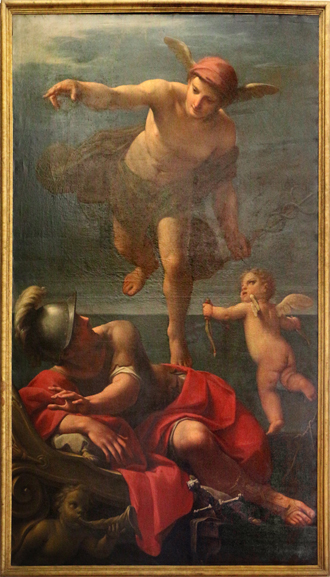Dido Queen of Carthage
Act IV Scene iii
Location: Perhaps near the port where the Trojan ships stand repaired and ready to sail.
Mercury has appeared to Aeneas in a dream with a reminder from Jupiter to continue his mission to Italy. Resigned to his fate, he contemplates saying goodbye to Dido in person, but feels he would not be able to resist her attempts to make him stay.
Aeneas:
Aeaneas...
Cannot ascend to Fames immortall house,
Or banquet in bright honors burnisht hall,
Till he hath furrowed Neptunes glassie fieldes,
And cut a passage through his toples hilles.
Dido, Queen of Carthage, IV.iii.9-12
Mercury's Message to Aeneas in a Dream
Aeneas appears on stage alone, bidding "adieu" to Carthage somewhat reluctantly. Hermes (Mercury) has appeared to him in a dream with a message from Jupiter, reminding him of his mission to Italy. As in the previous scene, the mortals seemingly have no choice but to follow the beck and call of the Gods. He summons his Trojan companions, tells them of his dream, and says it is time for them all to set sail. At the same time he is already feeling Dido's pull, imagining how she "casts her eyes like anchors out, to stay my Fleete from loosing forth the Bay" [IV.iii.25-6].
This message from Jupiter can be traced directly to Marlowe's source: Iarbus' sacrifice and prayers remind the God that Aeneas is not fulfilling his mission, triggering him to dispatch a messenger immediately. However, some commentators have wondered why Marlowe also has Hermes appear in person in scene V.i and whether this potential duplication is evidence of joint authorship. However, as well as Mercury's personal visit following Iarbus' prayer, also has Mercury appear to Aeneas later in a dream. So it is rather that the order has been reversed in the play than any unnecessary duplication.

Aeneas Resolves to Leave Dido
The Trojans sense Aeneas wavering, and move to convince him of the right course of action. Achates advises him to "banish that ticing dame from forth your mouth" [IV.iii.31] (c.f. Dido's reference to Helen as a "ticing strumpet" at II.1.300), and reminds his prince how this dalliance "is no life for men at armes to liue" [IV.iii.33]. Ilioneus reminds Aeneas of their purpose: "Will Dido raise old Priam forth his graue, and build the towne againe the Greekes did burne?" [IV.iii.39-40].
Aeneas seems convinced and bids his men board. But as they do so, he feels he should at least say goodbye in person. But he doubts whether he will have the will to resist Dido's inevitable pleadings for him to stay: "each word she sayes will then containe a Crowne, and euery speech be ended with a kisse" [IV.iii.53-4]. Accordingly he resolves to head straight to sea.
This first attempt of Aeneas' to leave Carthage quietly is Marlowe's addition. Is this another subtle attempt by Marlowe to blot Aeneas' character? He feels he would be unable to resist Dido's temptations, and thus determines to sneak off without even saying goodbye.